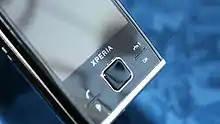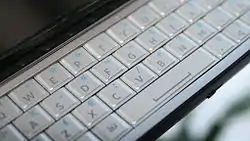 | |
| Manufacturer | Sony Ericsson |
|---|---|
| Series | Sony Ericsson Xperia |
| Availability by region | October 2009 |
| Predecessor | Sony Ericsson Xperia X1 |
| Successor | Sony Ericsson Xperia X10 |
| Related | HTC Touch Pro2 |
| Form factor | vertical arc-slider design |
| Dimensions | 110 × 54 × 16. mm |
| Mass | 155 g |
| Operating system | Windows Mobile 6.5 Professional |
| System-on-chip | Qualcomm MSM7200A |
| CPU | 528 MHz ARM11, Adreno 130 GPU |
| Memory | 256 MB RAM, 512 MB ROM |
| Storage | 512 MB ROM, 110 MB user-available |
| Removable storage | microSDHC (hot-swap) |
| Battery | Standard battery, Li-Po 1500 mAh (BST-41) |
| Display | 3.2-inch 16-bit color WVGA (800×480) TFT touchscreen (292 ppi) |
| Rear camera | 8 MP, WVGA @ 30 FPS, Front-facing VGA camer |
| Connectivity | Bluetooth 2.1 + A2DP miniUSB 2.0 3.5mm audio jack aGPS Wi-Fi 802.11 b/g |
| Data inputs | Touchscreen Handwriting recognition Stylus Full 4-row Keyboard |
The Xperia X2 (internal codename Vulcan), announced in September 2009, is a smartphone of the Xperia series by Sony Ericsson. It is the successor to the X1. Features include a 3.2-inch touchscreen, a sliding arc keyboard, an 8.1 MP camera, Wi-Fi, GPS, and 3G, among others. It runs Windows Mobile 6.5 and the home screen can be customised to the normal Windows Mobile 6.5 home screen, Xperia panels, or an isometric pixel art city.
The Xperia X2 is the last Sony Ericsson phone to use the Windows Mobile operating system.[1] The successor to the Xperia X2 is the Xperia X10, which runs on Android.[2]
Vodafone cancelled plans to exclusively offer the phone.[3]
In April 2010, Sony Ericsson launched its first upgrade (MR1). It upgraded Windows Mobile from 6.5.1 to 6.5.2 (which improved both the stability and usability of the device), it brought in the use of video telephony, and an FM radio and it introduced fast GPS to get a quicker fix. As well as all this, MR1 upgraded many of the applications in the phone to improve speed and usability and fix any bugs.
The second update MR2 went live in May and Windows Mobile was updated to 6.5.3. This was a significant upgrade in terms of usability, performance, power management, and the browser experience. Despite that MR2 was undoubtedly a move in the right direction, most of the users who send their feedback on the official Sony Ericsson product blog, developer forums and Sony Ericsson fan sites continue to complain that even after MR2 device is still unstable and lacks some key features such as support for Bluetooth remote SIM access (rSAP) profile which make X2 unable to pair with any modern premium car kits which are built into Mercedes, BMW, Audi, Skoda etc. – an essential feature for business users and executives who were intended to be the main target customers for the handset. After the MR2 upgrade, Sony Ericsson ceased development for the phone. This decision from the Sony Ericsson management was an unfortunate move, because the phone still contained multiple bugs that made life difficult for its users. The phone still contains a serious bug that corrupts the SD-card's content, and makes it an unreliable tool for business-users. Many users confirmed this bug, and one user on the Xda-forum figured out the cause to this bug. Due to the dropped support from Sony Ericsson, a fix to the data-loss bug was introduced on the forum.
Images
 Xperia X2 keyboard
Xperia X2 keyboard
References
- ↑ "Sony Ericsson Xperia X2 to be SE's last Windows Mobile device ?". MobileTechWorld. 9 September 2009. Archived from the original on 22 December 2016. Retrieved 8 November 2009.
- ↑ "Hands On: Sony Ericsson Xperia X10". PC Magazine. 20 November 2009. Retrieved 20 November 2009.
- ↑ Warman, Matt (11 January 2010). "Vodafone drops Sony Xperia X2 mobile phone". The Daily Telegraph. London. Retrieved 23 May 2010.
External links
- Xperia X2 specifications
- Xperia X2 FUN SITE Archived 17 July 2013 at the Wayback Machine